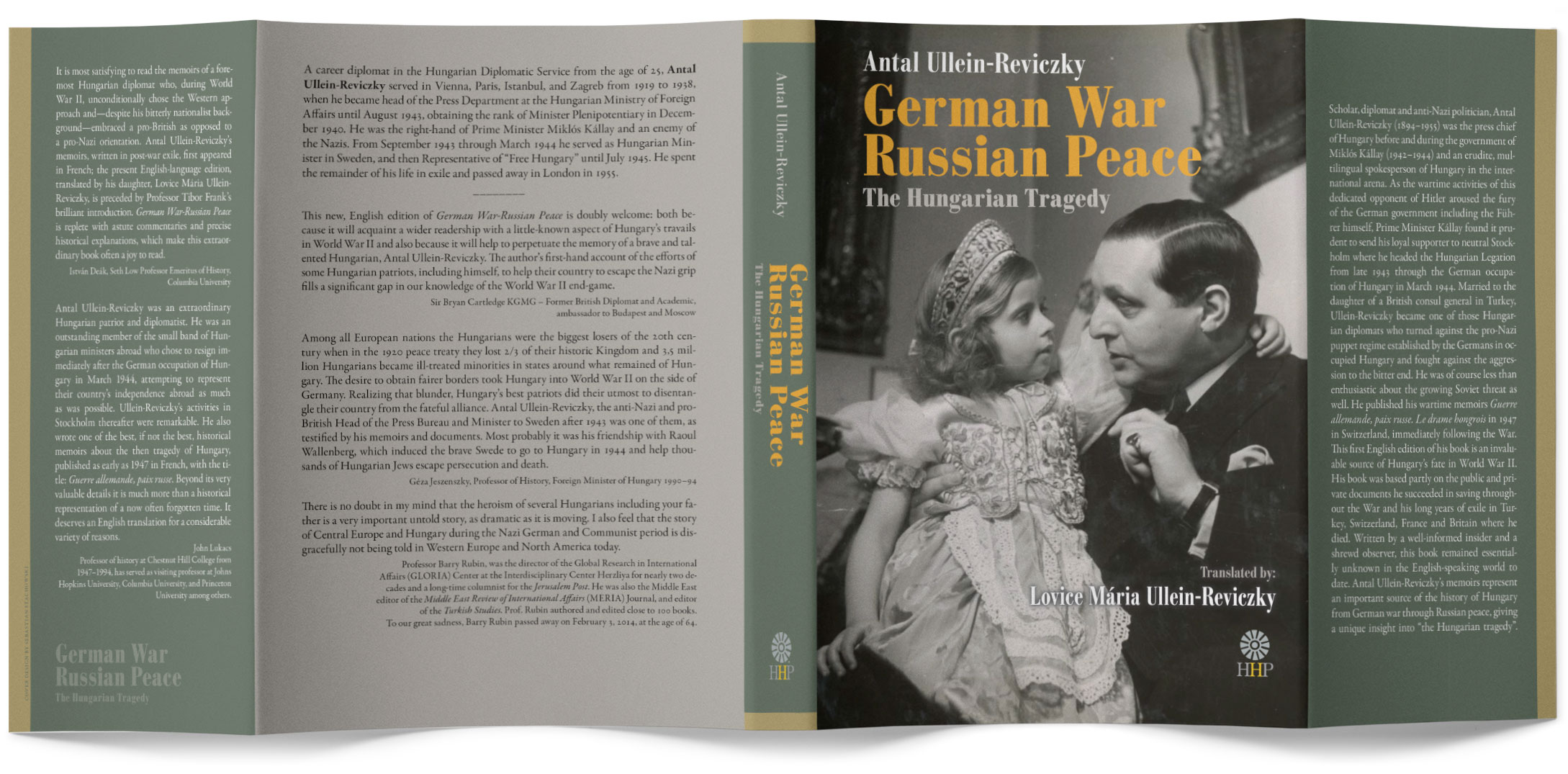German War / Russian Peace
The Hungarian Tragedy
Antal Ullein-Reviczky
Translated by Lovice Mária Ullein-Reviczky
A career diplomat in the Hungarian Diplomatic Service from the age of 25, Antal Ullein-Reviczky served in Vienna, Paris, Istanbul, and Zagreb from 1919 to 1938, when he became head of the Press Department at the Hungarian Ministry of Foreign Affairs until August 1943, obtaining the rank of Minister Plenipotentiary in Decem- ber 1940. He was the right-hand of Prime Minister Miklós Kállay and an enemy of the Nazis. From September 1943 through March 1944 he served as Hungarian Minister in Sweden, and then Representative of “Free Hungary” until July 1945. He spent the remainder of his life in exile and passed away in London in 1955.
Antal Ullein-Reviczky
Scholar, diplomat and anti-Nazi politician (1894–1955), press chief of Hungary before and during the government of Miklós Kállay (1942–1944) and an erudite, multilingual spokesperson of Hungary in the international arena. As the wartime activities of this dedicated opponent of Hitler aroused the fury of the German government including the Führer himself, Prime Minister Kállay found it prudent to send his loyal supporter to neutral Stock- holm where he headed the Hungarian Legation from late 1943 through the German occupation of Hungary in March 1944. Married to the daughter of a British consul general in Turkey, Ullein-Reviczky became one of those Hungarian diplomats who turned against the pro-Nazi puppet regime established by the Germans in occupied Hungary and fought against the aggression to the bitter end. He was of course less than enthusiastic about the growing Soviet threat as well. He published his wartime memoirs Guerre allemande, paix russe. Le drame hongrois in 1947 in Switzerland, immediately following the War. This first English edition of his book is an invaluable source of Hungary’s fate in World War II. His book was based partly on the public and private documents he succeeded in saving throughout the War and his long years of exile in Turkey, Switzerland, France and Britain where he died. Written by a well-informed insider and a shrewd observer, this book remained essentially unknown in the English-speaking world to date. Antal Ullein-Reviczky’s memoirs represent an important source of the history of Hungary from German war through Russian peace, giving a unique insight into “the Hungarian tragedy”.

It is most satisfying to read the memoirs of a fore- most Hungarian diplomat who, during World War II, unconditionally chose the Western ap- proach and—despite his bitterly nationalist back- ground—embraced a pro-British as opposed to a pro-Nazi orientation. Antal Ullein-Reviczky’s memoirs, written in post-war exile, first appeared in French; the present English-language edition, translated by his daughter, Lovice Mária Ullein- Reviczky, is preceded by Professor Tibor Frank’s brilliant introduction. German War-Russian Peace is replete with astute commentaries and precise historical explanations, which make this extraor- dinary book often a joy to read.
Antal Ullein-Reviczky was an extraordinary Hungarian patriot and diplomatist. He was an outstanding member of the small band of Hun- garian ministers abroad who chose to resign im- mediately after the German occupation of Hun- gary in March 1944, attempting to represent their country’s independence abroad as much as was possible. Ullein-Reviczky's activities in Stockholm thereafter were remarkable. He also wrote one of the best, if not the best, historical memoirs about the then tragedy of Hungary, published as early as 1947 in French, with the ti- tle: Guerre allemande, paix russe. Beyond its very valuable details it is much more than a historical representation of a now often forgotten time. It deserves an English translation for a considerable variety of reasons.
This new, English edition of German War-Russian Peace is doubly welcome: both be- cause it will acquaint a wider readership with a little-known aspect of Hungary’s travails in World War II and also because it will help to perpetuate the memory of a brave and tal- ented Hungarian, Antal Ullein-Reviczky. The author’s first-hand account of the efforts of some Hungarian patriots, including himself, to help their country to escape the Nazi grip fills a significant gap in our knowledge of the World War II end-game.
Among all European nations the Hungarians were the biggest losers of the 20th cen- tury when in the 1920 peace treaty they lost 2/3 of their historic Kingdom and 3,5 mil- lion Hungarians became ill-treated minorities in states around what remained of Hun- gary. The desire to obtain fairer borders took Hungary into World War II on the side of Germany. Realizing that blunder, Hungary’s best patriots did their utmost to disentan- gle their country from the fateful alliance. Antal Ullein-Reviczky, the anti-Nazi and pro- British Head of the Press Bureau and Minister to Sweden after 1943 was one of them, as testified by his memoirs and documents. Most probably it was his friendship with Raoul Wallenberg, which induced the brave Swede to go to Hungary in 1944 and help thou- sands of Hungarian Jews escape persecution and death.
There is no doubt in my mind that the heroism of several Hungarians including your fa- ther is a very important untold story, as dramatic as it is moving. I also feel that the story of Central Europe and Hungary during the Nazi German and Communist period is dis- gracefully not being told in Western Europe and North America today.

© Copyright 2020 by the Antal Ullein-Reviczky Foundation. All rights reserved.